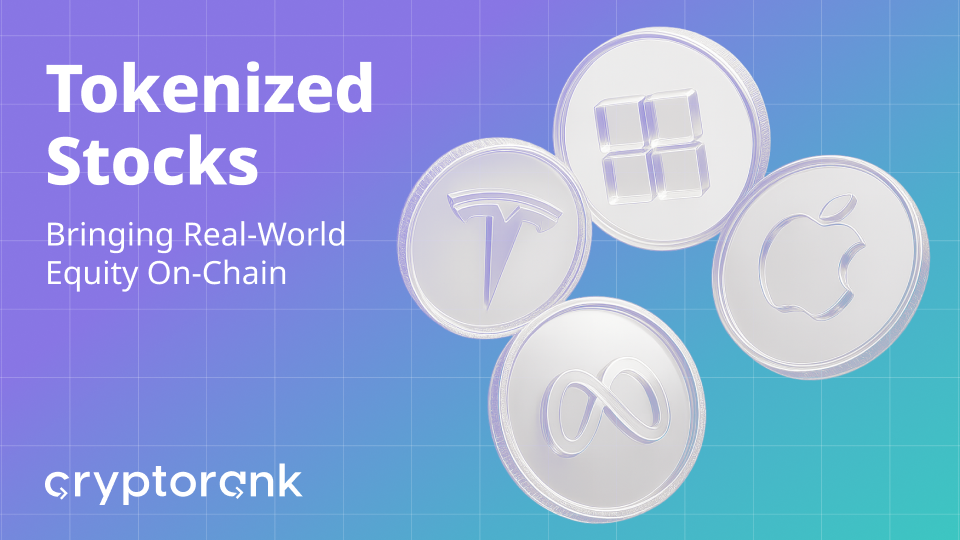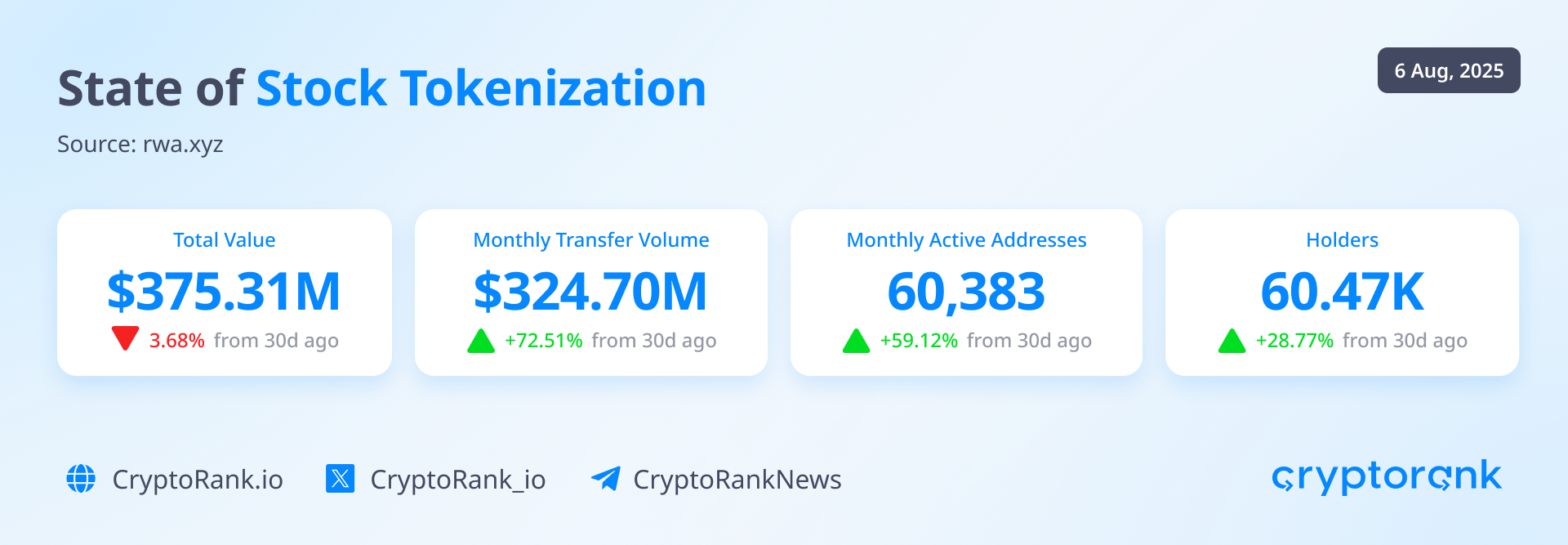Tokenized Stocks: Bringing Real-World Equity On-Chain


Intro
Throughout May and June, numerous platforms, including Robinhood, Solana, Kraken, and Bybit, launched trading for tokenized stocks. On July 31, SEC Chairman Paul S. Atkins unveiled "Project Crypto" – the initiative to bring the U.S. financial market on-chain. With CLARITY advancing towards enactment, on-chain equity is emerging as the next big thing. Let's explore how this transition unfolds and examine different tokenization models and platforms driving this new RWA wave.
Why Stock Tokenization Matters?
-
24/7 Trading: Trading beyond standard market hours creates superior arbitrage opportunities for traders who want to react immediately to breaking news.
-
Collateral in DeFi: Tokenized stocks can serve as collateral to borrow stablecoins or other digital assets. For instance, Kamino Finance on Solana has begun accepting xStocks as lending collateral.
-
Instant Settlement: Immediate settlement eliminates counterparty exposure and clearing risk, removing the traditional T+2 waiting period that creates unnecessary friction and capital inefficiency.
-
Automated Complex Strategies: Smart contract compatibility enables equities to be used in structured products and complex financial instruments. For example, an index-style basket of FAANG stock tokens could be wrapped into a single automated fund token.
Three Main Models for Stock Tokenization
Synthetic Stocks: Derivatives Without Equity Backing
Creating a token derivative that requires only a price tracking mechanism is the easiest way to "tokenize" an asset. Earlier examples include now-sunset Synthetix's sStocks and Mirror Protocol's mAssets on Terra, where tokens track asset prices via oracles and are minted against some crypto collateral. Similarly, gTrade (Gains Network) offers synthetic stock trading where positions are derivative contracts backed by collateral pools like USDC or DAI. This model proved unsuccessful due to various reasons, and pioneers either ceased operations (Mirror Protocol) or pivoted to other products (Synthetix).
Wrapper-Stocks: Backed 1:1 by Traditional Shares
Each token corresponds to actual shares held by a custodian or Special Purpose Vehicle (SPV). xStocks by Backed uses a Jersey-based, Bermudian SPV that purchases real stocks as collateral. Minting 1 AAPLx token triggers the SPV to buy 1 Apple share on the open market. Tokens are redeemable for cash value (not always the share itself) by verified holders. Dividends are either transferred or remain with the issuer, while voting rights always remain with it.
On-Chain Native Equity: Issued Originally on Blockchain
This model requires issuing shares directly onto blockchain and shareholder registration on-chain, where the token is the legal equity. Companies like Securitize help issue compliant security tokens representing actual equity or debt. For example, Exodus raised $75 million through Securitize's Mini-IPO in 2021, issuing Ethereum-based shares under Reg D/Reg A+ exemptions with voting smart contracts and automatic dividend distributions. Securitize CEO Carlos Domingo claims this as the only authentic way to represent securities on blockchain.
State of Stock Tokenization (End of July 2025)
Tokenized shares have reached approximately $500 million in total capitalization by the end of July 2025 and are distributed among more than 50,000 holders. However, this data is incomplete because it excludes Robinhood’s tokenized shares, which are not included due to their private issuance model and the restricted minting and burning infrastructure that makes them difficult to trace. At the time of writing, Robinhood has deployed 215 ERC-20 token contracts on Arbitrum. Each contract was created with an initial supply of zero, but all mints and transfers are whitelisted exclusively within the Robinhood app. This prevents accurate market cap calculations; but we estimate the market cap of their tokenized stocks to be similar to the total value of xStocks traded on Kraken, Bybit, KuCoin and Gate.io combined ($20M).

What Are the Main Stock Tokenization Platforms?
|
Comparison of Different Stock Tokenization Models |
||||||
|
Platform |
Backed Finance (bTokens) |
Backed Finance (xStocks) |
Securitize |
Dinari (dShares) |
Swarm Markets |
Robinhood |
|
Tokenization Model |
1:1 backed tracker certificates under Swiss FinSA/FinIA |
Bearer-bond tokens backed 1:1 via Bermudan distribution SPV |
Native on-chain equity under U.S. SEC and FINRA regulations |
SEC-approved derivative contracts backed 1:1 via regulated brokers |
Stock Certificate Tokens backed 1:1 via German SPV |
1:1 backed derivative contracts under EU/MiFID II |
|
Transferability |
Minted with KYC, then fully transferable |
Minted with KYC, then fully transferable |
Non-transferable, trading only on regulated trading systems |
Non-transferable outside platform |
Transferable via KYC-enabled AMM DEX |
Non-transferable outside Robinhood app |
|
Tokenholder Rights |
No dividends, no voting rights |
No dividends, no voting rights |
Full rights: dividends, voting, legal title |
Dividends in stablecoin; no voting rights |
No dividends, no voting rights |
Dividend support; no voting rights |
|
Chains |
Ethereum, Polygon, Base, Gnosis |
Solana, BNB Chain, Arbitrum |
Ethereum, Algorand, Polygon, ZkSync, Avalanche, Arbitrum, Base |
Ethereum, Arbitrum, Base |
Ethereum, Polygon, Base |
Arbitrum (future Robinhood L2 planned) |
|
Key USP |
No KYC secondary trading on EVM |
No KYC secondary trading on Solana |
True on-chain ownership |
A wide selection of tokenized stocks with dividends |
OTC for large volume trading |
The widest selection of tokenized stocks |
Backed Finance (xStocks)
Backed is a Swiss platform issuing fully collateralized tokens that track real-world securities (stocks, ETFs, bonds). Each token maintains 1:1 backing by underlying assets held with regulated custodians. Operating under Switzerland's DLT Act, Backed treats tokens as compliant securities for retail users. Minting requires KYC, but once minted, the tokens are freely transferable on DEXs or CEXs (excluding restricted jurisdictions). BackedFi has tokenized 71 RWA assets with an $82 million market cap and over 55,000 holders (bTokens and xStocks combined).
What Is the Difference Between BackedFi’s bTokens and xStocks?
Backed Finance's initial tokenized stock products were launched in 2022 with a "b" prefix (bCOIN, bAAPL, bTSLA, etc.), issued as ERC-20 tokens on Ethereum and later expanded to other EVM chains like Polygon, Base, and Gnosis. On June 30, 2025, Backed Finance rolled out a new generation as SPL tokens on Solana under the "xStocks" label (COINx, AAPLx, TSLAx) and formed the "xStocks Alliance" with exchanges.
Legally speaking, bTokens are tracker certificates governed by Switzerland’s FinSA/FinIA regime, while xStocks are bearer bonds that use a Bermudan distribution SPV, which allows tokens to be tradable globally 24/7 without stamp duty or share‑register updates.
At the end of July 2025, bTokens still lead in total tokenized stock value with approximately $50 million, while xStocks has reached $40 million just one month after launch. It is unlikely that the gap persists, since xStocks has tokenized six times more individual shares than bTokens.
Securitize
Securitize is a U.S.-based, SEC-registered digital securities platform that aims to onboard companies into raising capital on-chain. Investors in a Securitize-issued token become legal shareholders or limited partners, entitled to equity rights like dividends or voting power. However, tokens are not freely tradable on decentralized platforms, only on SEC-registered Alternative Trading Systems like Securitize Markets ATS, tZERO ATS, or INX One ATS. Overall, Securitize has tokenized over $3 billion in assets, including Blackrock’s BUIDL fund, VanEck Treasury fund, and Exodus equity shares.
Dinari
Dinari operates as an SEC-registered transfer agent offering tokenized US stocks (dShares) backed 1:1 by real shares in audited custodial accounts and USD+ stablecoin backed by short-term US Treasuries. The platform requires KYC verification and supports 130 tokenized assets. Users can mint/burn tokens, receive stablecoin dividends, and trade 24/7 with instant settlement, though voting rights are withheld. Dinari partnered with Gemini in 2023 for EU customer access. The platform remains small-scale with a $3.4 million tokenized RWA market cap and $42 million TVL (mostly stablecoins).
Swarm
Swarm Markets operates as a Germany-regulated AMM-based DEX (Balancer fork), enabling 1:1 backed tokenized RWA trading. The platform requires KYC verification through a "Passport" system for trading access. Verified users can swap, provide liquidity, or execute dOTC trades with configurable parameters. The $SMT utility token provides up to 50% trading fee discounts, liquidity rewards, and loyalty incentives. Despite years of operation, Swarm shows modest metrics: $1 million TVL, 10 tokenized assets, and 262 holders.
Robinhood
Robinhood tokenizes stocks via derivative contracts under MiFID II, where each token represents a contractual claim tied to one custodied share held by a US-licensed broker-dealer. Currently minting on Arbitrum with plans for a dedicated Layer-2 within Arbitrum Orbit, tokens cannot be transferred outside the platform. Robinhood provides dividend payouts but no voting or legal ownership rights. Tokens trade 24/5, with fractional purchases starting at €1.
Future Is Bright, But the Road Is Long and Challenging
According to Rob Hedick, general partner at Dragonfly Capital, while the long-term trajectory toward on-chain equity markets is bullish, current tokenized stock products will likely be disappointing before real institutional adoption and liquidity materialize.
He highlighted key unresolved problems and risks:
-
High price divergence risk: Tokens redeem at off-chain stock prices, not blockchain market prices. So if you buy a rising tokenized stock on a weekend but the weekday market opens lower, you will end up losing.
-
Weekend liquidity shock: Professional investors and market makers will likely withdraw liquidity during weekends and after-hours stress. That might create memcoin-like volatility with high slippage.
-
Cascading DeFi liquidations: Using tokenized stocks as DeFi collateral becomes dangerous when sharp off-hours price movements combine with market maker liquidity withdrawal. We potentially might witness major cascading liquidation events.
Best Assets for Stock Tokenization Market Play
While we are patiently moving toward on-chain equity markets, ETH and SOL remain the best bets on equity tokenization since increased tokenization demand directly drives network usage and gas token demand, boosting token prices. Ethereum (excluding L2s) already anchors nearly 60% of all DeFi TVL and 55% of regulated RWAs, including BlackRock's $2.4B BUIDL fund. Meanwhile, Solana-based Backed's xStocks hit $1.7B in cumulative trading volume and nearly $40M AUM within their first month, with tokens already accepted as collateral on Kamino.
Another noteworthy asset is Chainlink, which provides critical oracle infrastructure that makes tokenized securities technically viable and cross-chain compatible. As the primary oracle for RWA tokenization, Chainlink actively collaborates with institutions like SWIFT and Euroclear to promote tokenization adoption. LINK serves as an "index pick," benefiting from usage across multiple tokenization platforms, such as Backed, Securitize, Dinari, and Swarm.
The Bottom Line: This Time Is Different from 2021
This isn't the first wave of stock tokenization. The previous wave collapsed when major players like Terra's Mirror Protocol and FTX imploded after 2021's bull run due to opacity and inadequate asset backing. The current tokenized stock market still trails 2021's peak – Terra's Mirror Protocol alone reached $2B TVL in April 2021.
What makes this time different? Institutions are now actively driving the process both technologically and legally. Specifically, custody has become transparent and on-chain with verifiable 1:1 reserve attestations. Once CLARITY passes, the $100+ trillion U.S. stock market will no longer face legal barriers that prevent it from moving on-chain.




